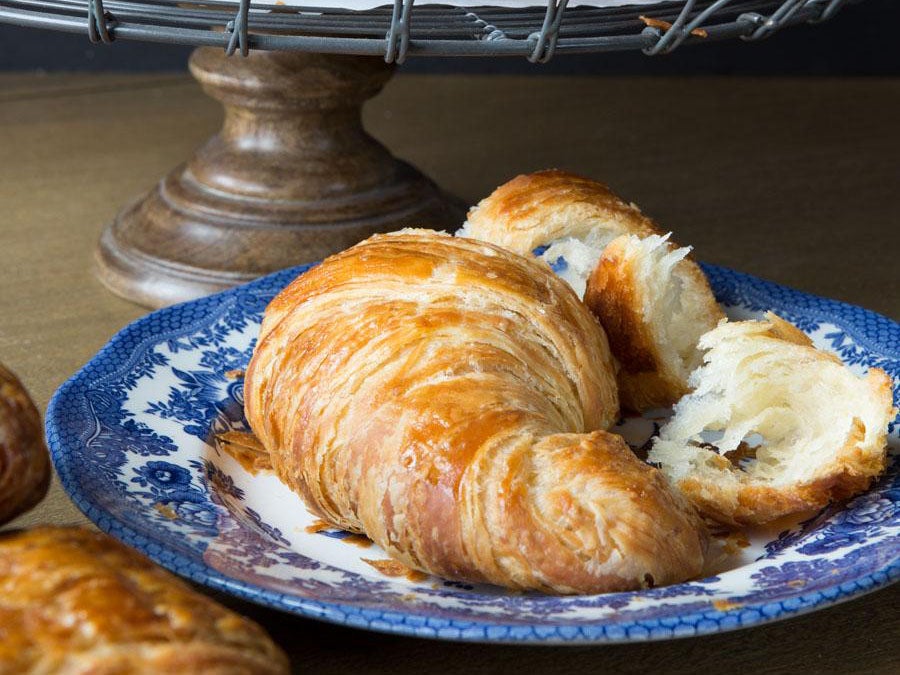Straight croissants? We’ve got so much to learn from our Gallic neighbours
The French invented the notion of luxury and ensured it remained just that

So what will we all call it, then? An oblong? A slab? A brick? It certainly can’t be called a croissant, because it isn’t.
Yet since Tesco’s “straight croissant” still uses flaky, buttery puff pastry, perhaps one should maintain a gesture of its original patisserie-based provenance in its name. “Tout droit”, as some wag on Twitter suggested. How about “brick” in French? Brique. As in “Madame, deux briques avec confiture, et deux grands crèmes ce matin, s’il vous plaît”?
Doesn’t really do it for me. Frankly, why bother to grace it with the French language at all? As Tesco is to dispense wholly with the croissant’s peerless and eponymous shape, why bother having anything with even the slightest reference to its name, so redolent as it is of fragrant and hedonistic moments at a café somewhere in l’Hexagone? Let’s just call a slab a slab, and abandon all efforts to remain elegant and graceful.
Because elegant and graceful is what a proper croissant is. The notion that it ought to be turned into some hideous rectangle – because that way, it’s easier to slather it with jam, fill it with cheese or, heaven forfend, spread it with butter (unnecessary due to the gallons of butter already in the pastry) – is surely simply one more step down the grim utilitarian path towards the state of... what did Emma Thompson call the UK?
Of course, the fact that one of our leading supermarkets is quite happily poised to replace the poetic new moon at the heart of a classic French petit déjeuner with an everyday easy-to-use version sums up the never-ending dance of difference between the UK and our nearest neighbour.
One of the telling things about France is that it never really had a significant industrial revolution. While Britain was pumping out not only the democratic brick but also mass-producing engines and machinery from dark satanic mills, France was busy a) reordering the monarchy and b) inventing the notion of luxury – and making sure it remained just that.
The clever notion of ring-fencing luxury goods with restrictions such as the famous appellation d’origine contrôlée (which began with Roquefort cheese back in 1411) is a French speciality in itself. Wine, champagne, cheese, salt marsh lamb, Bresse chickens, lavender, Corsican honey – they are all terribly special, thanks to the French AOC. Even inventions which don’t have an official AOC are restricted by vigorously protective branding: perfume, handbags, stockings, haute couture.
These are not mass-produced things; these are bespoke products, made for special occasions, and for special people. Even today, British things that want to appear refined and delicious have Frenchy-sounding names, from haute cuisine to Bournville chocolate.
And surely the bons vivants among us have the savoir faire to acknowledge that a properly crescent‑shaped croissant is a delicate and delicious thing to engage with of a morning. Every morning, if possible. Its shape may remind some of the Croisette, the beautiful sandy bay in Cannes, but I think the notion of the croissant (which arrived in France via the Austrians, who designed a crescent-shaped pastry to celebrate victory against the Turkish forces, whose flag features a crescent moon) is in spirit more like Haussmann’s notion for the redesign of Paris, where the mass production of windows, railings and rooftops is craftily hidden behind a high aesthetic style.
Yes, the curved croissant might be found in every café and hotel across the nation, but each one looks hand-crafted and beautiful. A basket of croissants turns breakfast into an occasion. It might be easier to slather jam across a rectangle, but the fundamental nature of eating a croissant – which must be broken off bit by flaky bit and delicately dabbed with jam or (sometimes) dipped in coffee – ensures that breakfast is a special meal to be enjoyed, savoured, a moment which might allow time for conversation, dalliance even.
I bet François Hollande and Julie Gayet wouldn’t dream of breakfast in bed with anything that wasn’t properly crescent shaped. And is it possible to imagine Simone de Beauvoir and Jean-Paul Sartre sitting down of a morning at Les Deux Magots to indulge in something with a “high spreadability factor”, as Tesco so prosaically puts it?
Join our commenting forum
Join thought-provoking conversations, follow other Independent readers and see their replies
Comments
Bookmark popover
Removed from bookmarks